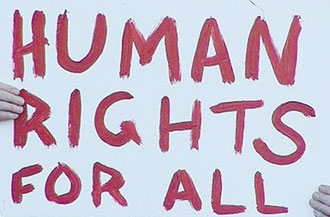
|
 |
 |
|
|
|
|
|
|
|
|
|
|
|
|
|
|
|
|
|
|
|
|
|
|
Conspiracy or Not, our Response should be
|
 |
Protesting against foreign interference in a human rights issue is widely ignored in today’s world. This issue needs to be addressed with a different approach. Sticking to “This is none of your business” or “we know what we are doing” is a worthless exercise.
2. Taking Bahrain’s and other countries’ experience into account, we realize that the human rights issue is a central one in relations between countries whether they are friends or foes. The phrase “human rights” could be used by any country against another. Even the USA is not immune from criticism. Its human rights records and the abuses it perpetrates in different parts of the world are frequently exposed (e.g. Guantanamo and Abu Ghraib prison in Iraq). Lengthy annual international reports continue to be published about the US human rights record. Using the phrase “human rights “by great powers, including those we classify as friends, to criticize Bahrain is nothing new. There are many countries that do not want to be added to the list of human rights abusers. Such an accusation damages any State’s reputation and affects its interests and standing in the international arena.
Because the human rights issue has become a significant element in International relations as well as a weapon that could be used to interfere in the internal affairs of other nations, states should immune themselves by adhering and committing to the International charters and agreements they’ve signed to, or brace themselves for harsh criticism and tense international relations If they choose to continue violating.
3. There is no doubt that it is near impossible to strip the human rights issue of its political dimension. Also, it is an issue that has its own independent entity. Human rights could either be used by some in a proper manner and for good causes, or it could be exploited for political blackmail. Our rejection of the latter does not mean that we condone abuse. Human rights respect is the target. Exploiting the issue by others is a result of some problem or mistakes that need to be rectified. To prevent exploitation and limit the chances of foreign interferences in our internal affairs, we need to reform our human rights record. We should not give any justification to those who want to exploit the issue for aims that have nothing to do with it.
4. It is important to understand the age we live in today. A new Middle East with its distinct local characteristics is taking shape. It is not a copy of the West and it is being propelled forward by a youthful popular power with a different outlook and aspirations compared to the previous generation. This new generation aspires for democracy, human rights, and a share in the political power, and have taken on board the modern technology of communication.
Therefore it would look ridiculous to close down these options or to close our minds and be oblivious to the world that is reshaping in front of our eyes. We are part of this evolving world, and we have a duty towards maintaining stability and security as well as fulfilling the legitimate aspirations of our people. We need to respect the choices of the people, not to circumvent them or concentrate only on satisfying their material needs. Such partial satisfaction does not cancel the political aspirations harboured by the new generation.
We need a mentality that understands this generation, that is aware of the changes and of the development in conceptions in our countries and the world around us. We need to deal with these changes with a rational mentality and a clear vision, in order to build a country that is free, proud, independent, stable and respectable.
Our choice should be to focus on reforming our political, social, and economic and human rights situation. We need to exert more efforts in this direction, and to address the reports and statements issued by states or human rights organizations, with a sense of responsibility if they lay bare our mistakes and expose where we went wrong. These reports would never stop altogether unless our home is in order with no human rights abuses.
This is the challenge that is facing us. The controversy we have in Bahrain today regarding foreign interference and conspiracy is nothing but a reflection of a clouded thinking. We have reached a stalemate in addressing the current development.
When decrying the criticism that we face regarding our human rights record, we have one of two options: Either to mend and reform our human rights situation, and by so doing, we prevent our critics from interfering in our internal affairs, or carry on committing the same mistakes, tarnish our reputation and jeopardise our relations with friends and allies. Whether the interferences by Washington, London, Paris, Brussels or Geneva are motivated by ethical and moral values, personal interests, or even blackmail, we will still have limited options in the face of such foreign interference.